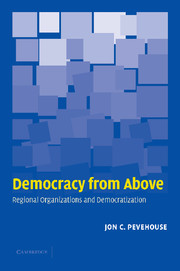Book contents
- Frontmatter
- Contents
- List of figures and tables
- Acknowledgments
- Abbreviations
- 1 Democratization and international relations
- 2 Regional organizations, the transition to and the consolidation of democracy
- 3 The supply-side of democratization and initial tests
- 4 Regional organizations and the transition to democracy
- 5 Regional organizations and the transition to democracy: evidence from cases
- 6 Regional organizations and democratic consolidation
- 7 Regional organizations and the consolidation of democracy: evidence from cases
- 8 Conclusion
- References
- Index
2 - Regional organizations, the transition to and the consolidation of democracy
Published online by Cambridge University Press: 22 September 2009
- Frontmatter
- Contents
- List of figures and tables
- Acknowledgments
- Abbreviations
- 1 Democratization and international relations
- 2 Regional organizations, the transition to and the consolidation of democracy
- 3 The supply-side of democratization and initial tests
- 4 Regional organizations and the transition to democracy
- 5 Regional organizations and the transition to democracy: evidence from cases
- 6 Regional organizations and democratic consolidation
- 7 Regional organizations and the consolidation of democracy: evidence from cases
- 8 Conclusion
- References
- Index
Summary
This chapter outlines two distinct but related theories: how do regional organizations influence the transition to democracy and the long-term survival of democracy? While each theory discusses the unique causal mechanisms linking each concept, both draw on similar literatures. First, I outline how regional organizations can assist in the transition to democracy by encouraging domestic liberalization, by providing protection to important elite groups, by socializing key elite groups, and by helping to legitimize transitional regimes so they may complete the transition. I follow with a discussion of how regional IOs can support the consolidation of democracy by helping nascent democracies credibly commit to certain policies, by conferring international validation on new regimes, by helping to deter anti-regime forces from moving against the young regime, and by providing resources to assist leaders in gaining the acquiescence of key elite groups.
Regional organizations and democratic transitions
In the process of moving from an authoritarian system to a democracy, regional organizations may assert influence at various stages of the democratization process. I show that pressures generated from outside the state in combination with internal forces can compel autocratic regimes to liberalize, loosening control over civil society and/or political institutions. Second, I discuss how membership in a regional institution can lead certain elite groups to acquiesce to liberalization since membership can lower the risks which these groups face during the democratization process.
- Type
- Chapter
- Information
- Democracy from AboveRegional Organizations and Democratization, pp. 15 - 45Publisher: Cambridge University PressPrint publication year: 2005

